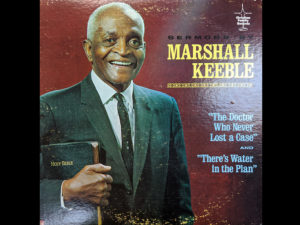 On a shelf in my office, I have a record album of sermons by Marshall Keeble. His might not be a familiar name to some (especially more than 50 years after his death, but he had a great impact on the church during the 20th century. Below is an excerpt from an article about Marshall Keeble from The Encyclopedia of the Stone-Campbell Movement. I thought you might enjoy learning more about his life and ministry. His story is a great reminder that even under difficult circumstances, we can make a difference in the lives of people and in the kingdom of God. – Brian
On a shelf in my office, I have a record album of sermons by Marshall Keeble. His might not be a familiar name to some (especially more than 50 years after his death, but he had a great impact on the church during the 20th century. Below is an excerpt from an article about Marshall Keeble from The Encyclopedia of the Stone-Campbell Movement. I thought you might enjoy learning more about his life and ministry. His story is a great reminder that even under difficult circumstances, we can make a difference in the lives of people and in the kingdom of God. – BrianBorn to former slaves near Murfreesboro, Tennessee, Marshall Keeble became in time the most successful evangelist among Churches of Christ, baptizing as many as 30,000. As a youth with a seventh-grade education, Keeble labored in a soap factory until he married Minnie Womack, a daughter of minister, S. W. Womack. The newly married couple opened a grocery store in Nashville. Under the tutelage of his wife and his father-in-law, Keeble began preaching in Nashville churches by 1897, and by 1914 was traveling on his own as an itinerant evangelist while his wife minded the store.
In 1918 Keeble planted a church at Oak Grove, near Henderson, Tennessee, baptizing eighty-four persons and coming to the attention of N. B. Hardeman, influential president of nearby Freed-Hardeman College. From 1920 until his death, Keeble traveled throughout the American South and, ultimately, worldwide at the expense of Nashville millionaire A. M. Burton…In Bradenton, Florida, Keeble and his helpers baptized 115 persons in one day and a total of 286 during that campaign.
After 1942, Keeble was nominally president of Nashville Christian Institute (NCI), a private academy designed to educate young blacks for ministry and evangelism. He traveled extensively in the company of young “preacher boys” evangelizing and raising money for the school. His fees for preaching were paid directly to NCI, since A. M. Burton provided Keeble’s salary and expenses…NCI continued until desegregation and the civil rights movement had made it an anachronism; it closed in 1967, less than a year before Keeble’s death.
Keeble’s life had been hard in many ways. His first wife and all five of his children preceded him in death. He suffered indignity, insult, and injury from racists in and out of the church. Such assaults did not deter him, but neither did he resist them directly. When Keeble died two weeks after the assassination of Martin Luther King Jr., many of his white eulogists offered invidious comparisons between Keeble and King. Yet one of his “preacher boys,” Fred D. Gray, inspired by Keeble’s preaching and example, had by then become the attorney who helped overturn…segregation and discrimination in the American South, representing Rosa Parks, King, the Southern Christian Leadership Conference, and many other activists and causes in the civil rights struggle.

what an example to follow. A true Christian to follow. Marshall Keeble following his Lord.
Thank U!
I would like to get any notifications that you offer. I’m a member of the Church of Christ at Fountainhead in Portland, Tennessee
thank you